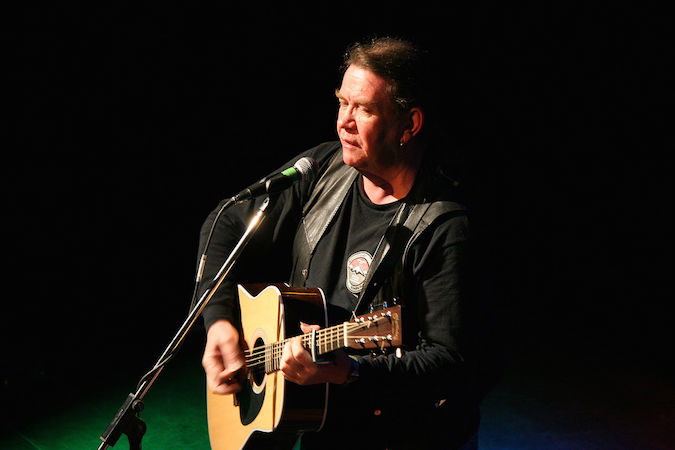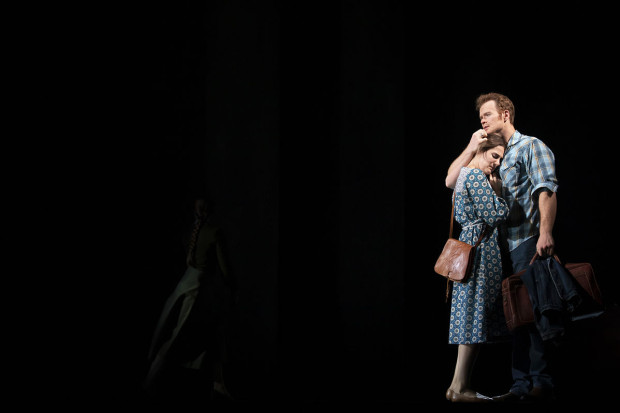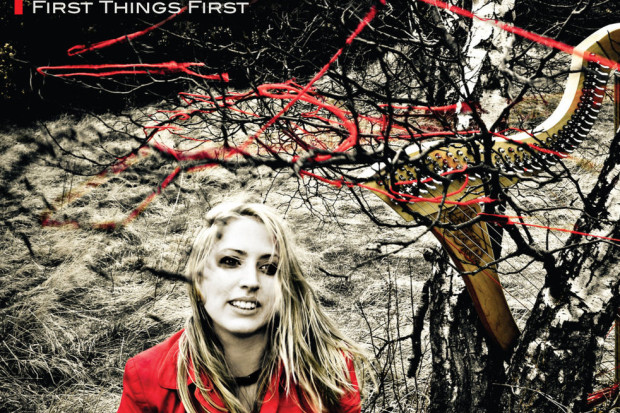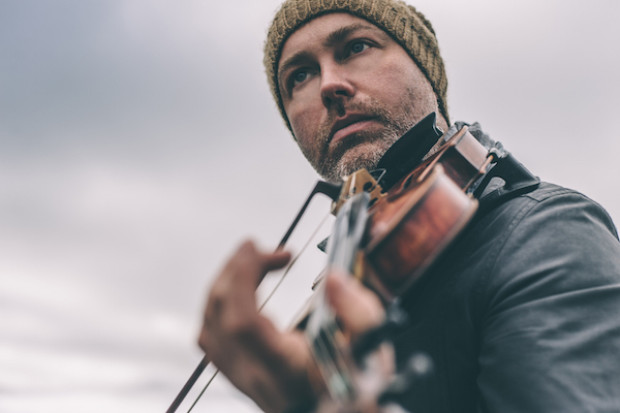
The difference between a rebel and a revolutionary: an interview with Dick Gaughan
Julie Coghill: It’s been over a year since we saw you in Ireland. What have you been up to in the meantime?
Dick Gaughan: Round in circles with a guitar. My life has no great surprises like that. I just tend to be on tour most of the time.
JC: You’ve been touring with Brian Mac Neill. How has that worked out considering that in recent times you have toured mainly as a solo artist?
DG: Well I’ve been in and out of bands and other combinations over the years. I’m probably happiest playing in a band, but what I probably do best is stand on stage on my own. It’s a trade between the two. It’s been great working with Brian. We’re not doing an awful lot together, primarily festivals and things like that. We’ve known each other for god knows how long and played together in different combinations. Brian’s one of these larger than life people on stage so it’s nice to have that to bounce off. I enjoy it a lot.
JC: You’ve also been working on a new album?
DG: Yes, Outlaws and Dreamers. It’s just recorded. It will be out on the first of October. It’s very acoustic, the most acoustic thing I’ve done in twenty-five years. I thought it would be a good idea just to go in and record something with just voice and guitar. I departed from that a couple of times, but mostly it’s just with guitar. It was done as live as possible. It will be interesting to see what people make of it.
JC: You have never been very prolific when it comes to recording, but have toured intensively and extensively throughout your career. Why do you attach such importance to live performance?
DG: Because it’s what I do. When my younger kid Sean was growing up, I took a lot of time off the road just to be at home. I was spending an awful lot of time in studios and writing music for films and stuff like that and it finally occurred to me somewhere along the line, that what I actually do is stand up on a stage and try to communicate with people. I love the danger of it. Walking on a stage by yourself and there is nowhere to hide, you just have to get on with it. Sometimes it’s a pain in the arse. When you play in a place and its full of drunks and there is nothing you can do about it. But on the occasions when it’s good and it all works there’s nothing quite like it. It’s quite magical.
JC: So you’ll never tire of the road?
DG: No I don’t think that I ever will. If I ever tire of it I won’t still be doing it. It seems to be what I’ve always done and what I’m best at, whatever that is! I treat live performance like a conversation. It’s interesting because it’s a conversation where the other party in the conversation is not really aware of the fact that they are taking part. People going to live performances tend to imagine that it’s a passive experience. That they go there and listen to what’s happening and then they leave. But that’s not true, no matter how passive they think they are being they are actually taking part in the conversation. A lot of what I talk about depends on how people react to what it is I am saying. If I say something that shocks an audience, or something that challenges a preconception, then I tend to follow that for a while. So it’s by no means a one-way thing.
JC: I’ve seen you do that – challenge the audience – most notably at a Dublin gig with a ‘conversation’ about nationalism.
DG: I have on many occasions made my views clear on the negative aspects of nationalism. But I do not believe that nationalism in itself is anything other than a good thing. I believe that a sense of national identity is an integral part of all human beings, the need to belong to a culture and to be part of it. If you take the example of Germany, through the 1920s after the First World War the whole German sense of identity was denied and it became terribly unfashionable to claim any sense of national pride in being German. Which is what the Nazis exploited. The negation of a national identity creates more problems than it solves. But for each to be proud of who they are themselves and to be proud of their own culture, they must also be proud of everybody else’s as well, to respect and recognise that other people have different cultures and that ours isn’t any better than theirs. It’s just different.
JC: What difference has Scottish devolution made to nationalism in Scotland and what difference do you see it making to the future?
DG: I think that Scottish devolution in itself is a waste of time. But the devolving of power – however limited from London to Edinburgh – has set us on a road that I believe is inevitable. As soon as you devolve power from London to Edinburgh you create a conflict of interest between what Scottish people want and what Britain as a whole might want. And I believe that contradiction can only now be resolved by complete independence. What’s happening in Scotland is an analogous of what was happening in Ireland a hundred years ago. I do not think or hope that there will be a violent revolution in Scotland. But I do believe that there is inevitability now about Scottish independence, at least I hope so, because I’ve spent my bloody life fighting for it!
JC: Do you feel that there is apathy amongst Scottish people regarding independence when you compare it for example to Irish nationalism in the past?
DG: I don’t think its apathy. I think its inertia. And that existed in Ireland up until 1916. Pre-1916 there was an inertia there, people saying ‘just leave us alone and let us get on with our lives. It might be bad but it could be worse’. Suddenly 1916 comes. The executions that come at the end of Easter week and the revulsion that went through Ireland and the feeling of ‘let’s do something about this’, tried to express itself politically. The political expression of will was repressed so there was an inevitable reaction to it. That brought about a violent revolution.
I think in Scotland the same thing is true. We have to look at our history. We spent a couple of hundred years basically having the shit kicked out of us. By the time the twentieth century came about, particularly in the aftermath of the First World War, people just got their heads down and tried to survive. The devastation to self-confidence in Scotland was savage. We had the same thing as existed in Ireland, a stigmatisation of the culture and language. And there was an attitude amongst people in southern Scotland that the culture of the north was insignificant or backward.
And the glorious thing across the course of my lifetime has been seeing so many of the old barriers fall down and people developing a sense of what it is to be a Scot. And sure we’re arguing about it, and we are fighting about it and a lot of the old bitterness and prejudices still remain. Twenty-five years ago it would have been unthinkable to put on a concert of young people playing and singing in Gaelic in Edinburgh or Glasgow. Nobody would have been there. If you are putting on a concert of traditional Scottish music now it would be ridiculous to put it on without at least half of the concert being Gaelic singers. I was laughed at as a kid because my mother was a Gaelic speaker and there were no Gaelic speakers in Edinburgh. So I grew up not speaking Gaelic and the only time my mother spoke the language was when she spoke to my grandfather who was an Irish speaker. But I might as well have come from Mars and had two heads. So much of that now is disappearing. There is now a new spirit of self-confidence emerging in Scotland – especially among younger people – that was not there when I was growing up. We had to fight for the right to have out own identity.
When I was 22 I had to go to London to make a record, to find anybody to record me, to find gigs. Because if you weren’t known in London or established there nowhere else would touch you. Now, in the space of 20 years, that’s completely changed. Nobody has to leave Scotland in order to make a career for themselves. They can if they choose to do so. But they don’t have to because there are plenty of opportunities here now.
JC: You are seen principally as a Scottish musician, however your influences and materials are diverse. From which sources do you feel you have drawn the most inspiration?
DG: Everything that I do is based on what I learned when I was a kid. My formative influences were the fact that firstly my mother was a highlander and a Gaelic speaker and singer and that my father’s family were Irish and musicians. I was brought up with a sense that the Scots and the Irish are the same people. I was very aware of the similarities between the two. I was aware of the distinctions as well but those were more cosmetic than anything else. We share ways of thinking. Those circular, round-the-corner ways of thinking that Irish people have, exist here exactly the same way. That love of communication and of exploring ideas is common to both sides.
Also the musical traditions we have are very closely related. I grew up with traditional Irish music and song and traditional Gaelic song. The basis of everything I do is rooted within that. I have an enormous amount of respect for it but take liberties with it. It’s not something that should be put on a pedestal or in a museum. It’s a living thing and living things change and evolve. So I have very serious arguments with the ‘purist traditionalists’ because they seem to have this idea that things should remain unchanged. Well that’s fine if you want to collect stamps! You have to start off with learning the ways that it’s been done in the past and understand the development of the tradition. But you can’t fossilise it and say this is the way it has always been, because it hasn’t always been that way at all. It has changed and evolved over thousands of years and we have a responsibility towards it to allow it to grow and breathe. And to try and ossify it kills it, so often the very people who are trying to preserve it are the people who are killing it.
JC: You said in a news group posting recently that you’ve ‘gone in thirty years from being an angry young man to a bad tempered old bastard’. To what degree have your opinions and beliefs evolved/changed in that time?
DG: (Laughs) They’ve grown and changed in as much as anybody’s grow and change. If I believed the same things now at 53 that I believed at 23, I would think that I hadn’t done much with my life in between. The basic principles that I’ve held most of my life haven’t changed. The political views that I’ve held I haven’t changed because I’ve seen nothing that’s persuaded me that they are wrong. I’m perfectly willing to change them if there’s evidence that I’m walking down the wrong road – then I’ll get off it and walk on another one.
My passion for the traditional music of my people has deepened in years. The principles that I have tried to live my life by are the same as they ever were. I can’t stand pretension. I can’t stand people trying to give themselves airs and graces. I can’t stand inequality. I despise a culture that is based upon making a fast buck and where the only morality is, does it or does it not make a profit. Possibly I’m more violently opposed to that than I ever have been in my life because I see it taking more and more and more hold of peoples’ consciousness. I find it appalling that any society can disintegrate and deteriorate to the point by which profit is the level by which they measure their lives.
JC: You have been involved with the world wide web and the internet since the early days and have witnessed its overwhelming progress and a development as a microcosm of society in general. Where do you see it going from here?
DG: I’ve watched it with great amusement over the last four or five years because suddenly it became the great new thing and there were a few people made a lot of money out of hyping it. And they hyped an illusion. It was perfectly obvious to anyone who knew anything about how it worked that using the internet as a method of advertising was doomed to failure. And they are all pulling out now because they realised that it was a short-term thing. I have great confidence in where it will go. Because I think what will happen is there is likely to be a separation within it. There will be the Microsoft/Bill Gates driven business-merchandising internet. And there will be an internet of people like me who just love the whole idea of being able to communicate across language, across culture. And ninety-nine per cent of the stuff that exists on the internet is dross. But that is bound to be the ay because if you allow every human being in the world access to an area where they can vent their opinion then what you are going to get is nine¬ty-nine per cent shite (laughs). Because ninety-nine per cent of what people think is largely shite. But the one per cent of gems that are there is worth all the dross. If the price I have to pay for access to just one good idea is to have to sift through ninety-nine per cent garbage then I’m prepared to do that. Because I think it’s worth it.
JC: I find it difficult to accept that someone with such obvious socialist beliefs truly thinks that ninety-nine per cent of the world population’s thoughts or opinions are worthless!
DG: I’m aware of the fact that that sounds terribly opinionated and arrogant! But the majority of people – their thoughts and opinions aren’t actually thoughts and opinions at all. It’s stuff that they have read in newspapers or seen on television. We went through a long period where everything had to be instant. People didn’t want to sit down and talk for hours to figure out what they thought about something. Informed opinion has become much more of a rarity. Which is what I mean when I say ninety-nine per cent dross. It’s people regurgitating things that they’ve read. There are areas on the internet where it’s possible to go and discuss things and read things that people have thought seriously about – they have figured out their way through it rather than somebody saying, ‘I think asylum seekers should all be sent home.’ That doesn’t tell me anything. If we are going to discuss something like asylum seekers – let’s find out as much as we can about what’s happening around it. And it’s possible to do that using the internet. It’s possible to find out the information that will allow the development of an informed opinion. Sometimes I have a habit of expressing things in a fairly blunt way, but there is more that lies behind it than just that.
JC: You have used your music both to entertain and as a vehicle to express your political beliefs. You protested relentlessly on behalf of the miners and the trade unions during the strikes of the 70s and 80s and vehemently opposed apartheid in South Africa. It would seem you are a man of causes. In this climate of political/social apathy, what issues do you feel the need to sing about?
DG: I avoid issues as much as possible because I’m not fighting about issues. If I’m fighting about anything at all it is about liberation of human beings and creating a world where it is possible for all human beings to achieve whatever potential they have. I think that for all the economic crimes that exist within capitalism, the worst poverty of all is the poverty of expectation. We have created generation after generation who do not expect a decent life and who don’t expect to be able to fulfil themselves. And I think that is an appalling waste of human ability. I was brought up in that world. Somebody from a different background pushes the door handle and they expect the door to open. People from my background expect the door to be bolted and barred against us and we’re going to have to kick it down in order to get through it. In spite of the awfulness of material poverty, the spiritual poverty and the intellectual poverty that it creates is far worse. I don’t get involved that often in specific issues, because I’m not fighting against things. I’m fighting for. And I believe that’s the difference between a rebel and a revolutionary. A rebel knows what they’re fighting against. But a revolutionary knows what they’re fighting for. And I’m fighting for change. Not against what exists. I’m only against what exists because it is in the way of change.
JC: What influence or effect do you think your songs have on your audience? Or what influence would you like them to have?
DG: Well I’ve said it many’s the time that songs don’t change anything. The best that I can hope for, standing on a stage, is that they maybe change the way people feel. A great American songwriter called Yip Harburg (he wrote ‘Brother, can you spare a dime’ and ‘Somewhere over the Rainbow’) once said ‘Words make you think thoughts and music makes you feel feelings and a song makes you feel a thought.’ You can appeal to people’s sense of injustice as much as you like, but until they actually feel anger at that injustice they won’t do anything about it. The best that singers like me can do is to try to make people feel differently about things. Then maybe in turn that will change the way they think and if I change the way they think, maybe they will change the way they act.
There’s a great old story about a girl walking along the beach after this dreadful storm. And she’s walking along the beach and away in the distance she sees this fellow bending down and standing up and bending down and standing up. So she goes along and watches what this guy is doing, and the beach is covered in jellyfish. They’ve all been washed up on the beach and this guy is picking up jellyfish and throwing them into the sea. So the girl goes over and says what are you doing? And the man replies, ‘I’m saving jellyfish,’ and then she says ‘But look, there’s millions of them. What difference are you going to make?’ So the guy bends down and he picks up another one and throws it into the sea – and says, ‘I made a difference to that one!’ And that’s all any of us can do. Throw jellyfish into the water.
Published on 1 September 2001














